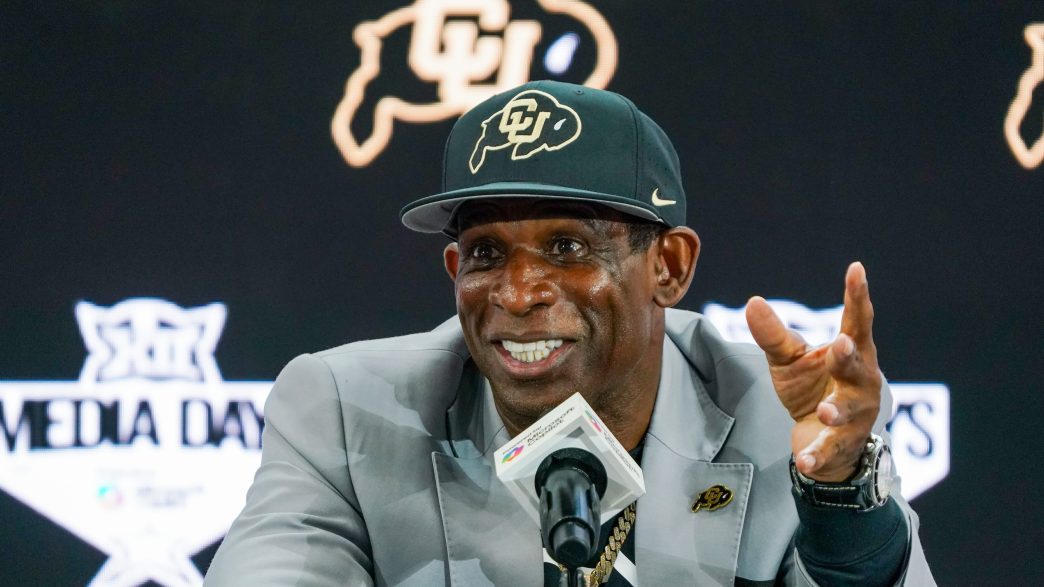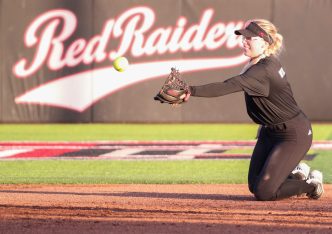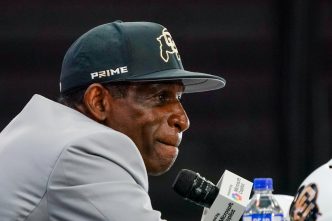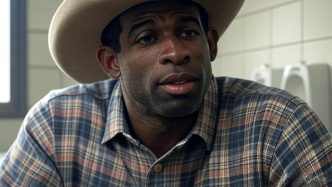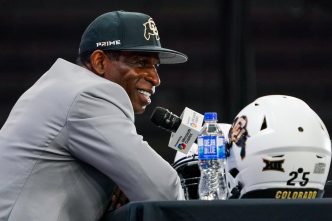Deion Sanders is navigating a new chapter in his life, both personally and professionally, after undergoing bladder removal surgery in May due to cancer. As the head coach of Colorado football, he’s grappling with a unique set of challenges that go beyond game strategies and playbooks. One pressing question looms large: “Can I make it through a game?” Sanders posed this concern during a recent podcast with his former Dallas Cowboys teammate, Michael Irvin.
At 57, Sanders is not one to shy away from adversity. While he has never contemplated retirement, he’s been candid about how his health situation—specifically incontinence and a neobladder built from his small intestine—will affect him on the sidelines. “I know I got halftime, but can I make it through a game?” he reflected, humorously considering the practicalities. The idea of needing a portable toilet on the sideline brings a dose of reality to the situation, one that he approaches with his trademark humor yet underlines the seriousness of his condition.
As Sanders embarks on this journey, medical professionals weighed in on what life might look like post-surgery for someone in his position. The concept of a neobladder—created from his small intestine—is crucial here. Unlike traditional catheters that externalize waste management, a neobladder allows patients to urinate through their native urethra, although it requires some adjustments. According to Dr. Solomon Woldu, an associate professor of urology, patients with neobladders must rely on abdominal muscles to push urine out, which can lead to some inefficiencies, especially during recovery.
Sanders candidly shared his experiences, indicating that he will need to actively manage the process: “You have to push through your stomach and force the pee out. When you feel like you gotta go pee, you need to pee or you’re gonna start leaking.” This doesn’t just reflect the physical adjustments he must make; it also highlights a sense of vulnerability he’s experiencing as an athlete known for his strength and agility.
To assist with this transition, Sanders openly discusses wearing Depend garments, a partnership he’s engaged in to reduce the stigma surrounding incontinence. “Thank God for Depend,” he quipped, bringing humor into a challenging situation while aiming to raise awareness. The logistics of being a college football coach during hot, lengthy games present another layer of complexity, especially with a newly constructed bladder that has less capacity than normal.
Dr. Adam Kibel, chair of the urology department at Mass General Brigham, explains that a neobladder can typically hold about the volume of a grapefruit, far less than a healthy bladder. This illustrates the hurdles Sanders may face: a college football game can stretch close to four hours—unexpected conditions where he’ll need to manage hydration while also balancing trips to the restroom.
So, will Sanders be able to make it through a full game? The answer seems cautiously optimistic. As he adapts to this new normal, Kibel noted that as long as Sanders focuses on regaining his stamina post-surgery, he should maintain a presence on the sidelines that’s familiar to fans. This has been a consistent theme for him, recovering from previous leg surgeries that also made for tough adjustments during game days.
In past weeks, Sanders has shed some of the physical encumbrances stemming from his treatments. He shared through social media updates that he is now walking without the bags and tubes that accompanied his recovery efforts. Initially requiring a catheter, he indicated that the necessity for such support was temporary, typically lasting about two weeks.
Most importantly, according to his doctor Janet Kukreja, Sanders is a cancer survivor. He opted for the removal of his bladder upon discovering a malignant tumor during a routine check-up—a decision that reflects not only his determination but a proactive approach to health risks. Though he acknowledges that his new neobladder will continue to improve, he is realistic about the long-term adjustments that come with these medical changes.
In a world where the term “cancer” is often laden with dread, Sanders embodies a fighting spirit that resonates throughout his journey. “When we hear that word, it’s normally a life sentence attached to it,” he stated. But with his characteristic resolve, he asserts that his story is about overcoming, not being defined by the disease. As he prepares for the upcoming season, the eyes of the football community will be on Sanders, rooting not only for his team’s success but also for the endurance of a legend redefining what it means to battle adversity.


